Report on Entrepreneurial Ventures and Small Business Start-Ups
VerifiedAdded on 2020/11/12
|12
|3945
|471
Report
AI Summary
This report delves into the multifaceted world of entrepreneurship and small business management, examining different types of entrepreneurial ventures such as serial, female, social, and lifestyle ventures, and their interrelationships. It highlights the similarities and differences between these ventures, emphasizing how micro and small businesses impact the economy by creating job opportunities, infrastructure development, and product diversity. The report further underscores the importance of small business start-ups in fostering social economic growth through poverty reduction, employment creation, and the provision of social amenities. It also studies the key skills and characteristics of successful entrepreneurs, contrasting them with those of traditional business managers, and assesses how entrepreneurial mindsets and backgrounds can influence business outcomes, offering a comprehensive analysis of the entrepreneurial landscape.

Entrepreneurship And
Small Business
Management
Small Business
Management
Paraphrase This Document
Need a fresh take? Get an instant paraphrase of this document with our AI Paraphraser
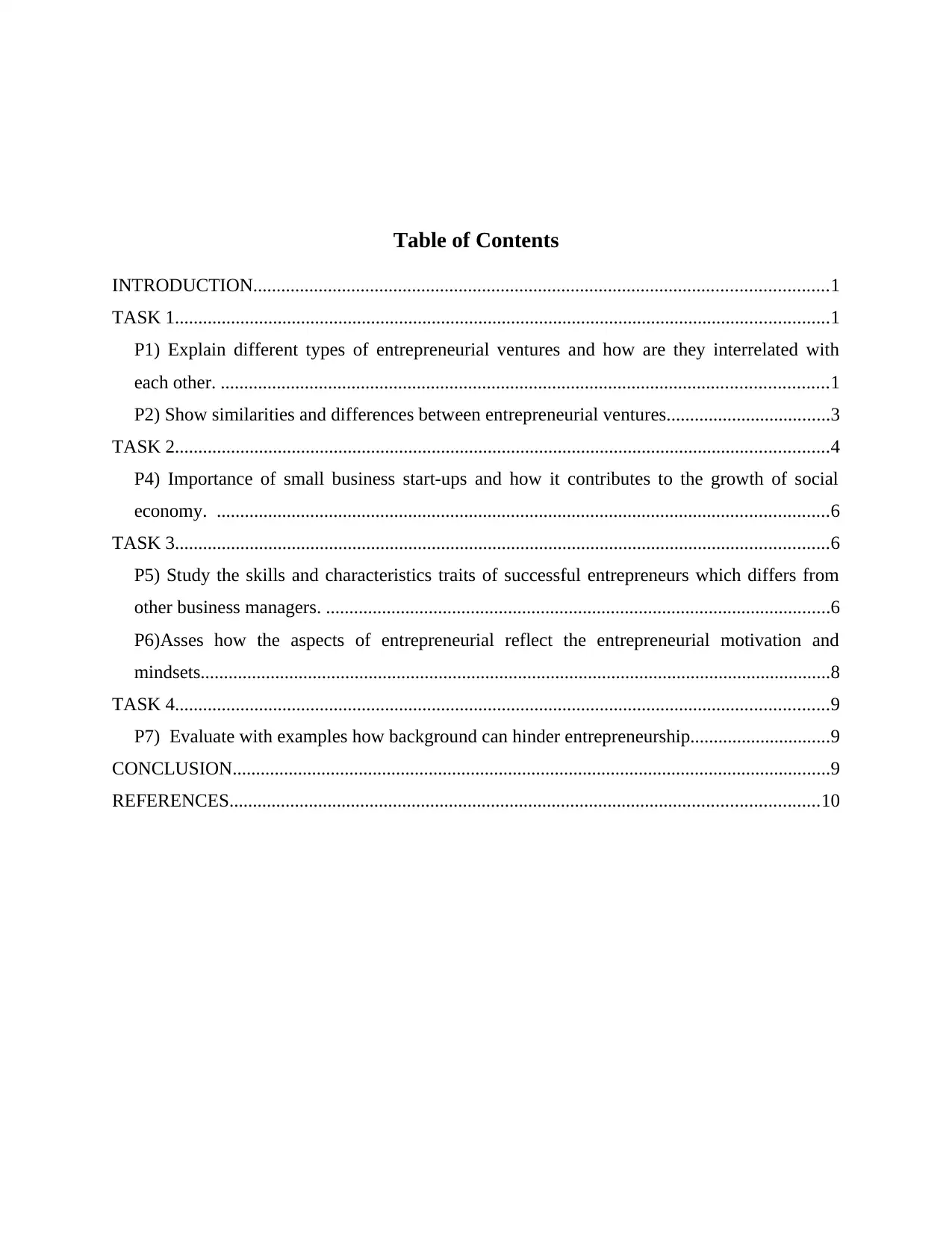
Table of Contents
INTRODUCTION...........................................................................................................................1
TASK 1............................................................................................................................................1
P1) Explain different types of entrepreneurial ventures and how are they interrelated with
each other. ..................................................................................................................................1
P2) Show similarities and differences between entrepreneurial ventures...................................3
TASK 2............................................................................................................................................4
P4) Importance of small business start-ups and how it contributes to the growth of social
economy. ...................................................................................................................................6
TASK 3............................................................................................................................................6
P5) Study the skills and characteristics traits of successful entrepreneurs which differs from
other business managers. ............................................................................................................6
P6)Asses how the aspects of entrepreneurial reflect the entrepreneurial motivation and
mindsets.......................................................................................................................................8
TASK 4............................................................................................................................................9
P7) Evaluate with examples how background can hinder entrepreneurship..............................9
CONCLUSION................................................................................................................................9
REFERENCES..............................................................................................................................10
INTRODUCTION...........................................................................................................................1
TASK 1............................................................................................................................................1
P1) Explain different types of entrepreneurial ventures and how are they interrelated with
each other. ..................................................................................................................................1
P2) Show similarities and differences between entrepreneurial ventures...................................3
TASK 2............................................................................................................................................4
P4) Importance of small business start-ups and how it contributes to the growth of social
economy. ...................................................................................................................................6
TASK 3............................................................................................................................................6
P5) Study the skills and characteristics traits of successful entrepreneurs which differs from
other business managers. ............................................................................................................6
P6)Asses how the aspects of entrepreneurial reflect the entrepreneurial motivation and
mindsets.......................................................................................................................................8
TASK 4............................................................................................................................................9
P7) Evaluate with examples how background can hinder entrepreneurship..............................9
CONCLUSION................................................................................................................................9
REFERENCES..............................................................................................................................10
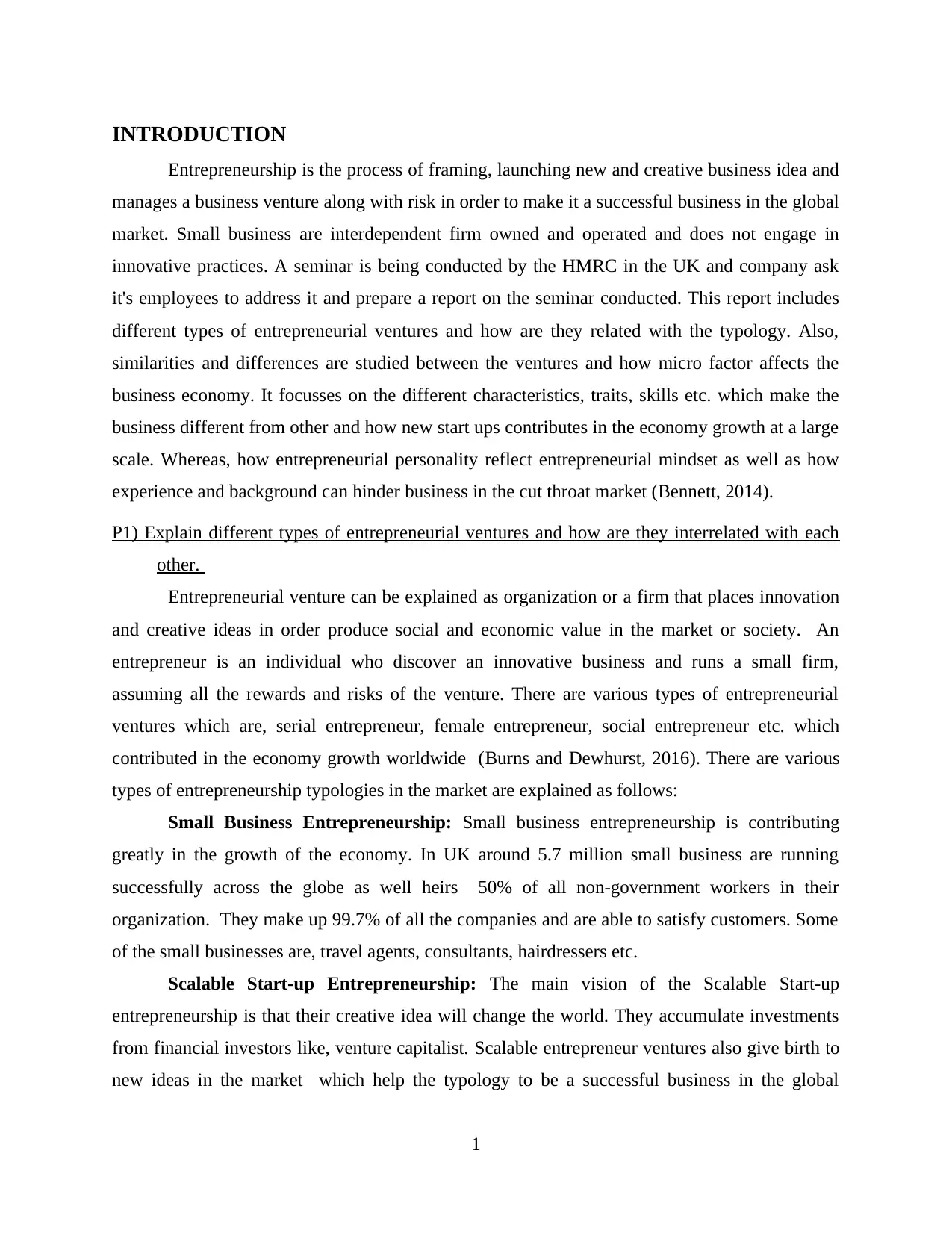
INTRODUCTION
Entrepreneurship is the process of framing, launching new and creative business idea and
manages a business venture along with risk in order to make it a successful business in the global
market. Small business are interdependent firm owned and operated and does not engage in
innovative practices. A seminar is being conducted by the HMRC in the UK and company ask
it's employees to address it and prepare a report on the seminar conducted. This report includes
different types of entrepreneurial ventures and how are they related with the typology. Also,
similarities and differences are studied between the ventures and how micro factor affects the
business economy. It focusses on the different characteristics, traits, skills etc. which make the
business different from other and how new start ups contributes in the economy growth at a large
scale. Whereas, how entrepreneurial personality reflect entrepreneurial mindset as well as how
experience and background can hinder business in the cut throat market (Bennett, 2014).
P1) Explain different types of entrepreneurial ventures and how are they interrelated with each
other.
Entrepreneurial venture can be explained as organization or a firm that places innovation
and creative ideas in order produce social and economic value in the market or society. An
entrepreneur is an individual who discover an innovative business and runs a small firm,
assuming all the rewards and risks of the venture. There are various types of entrepreneurial
ventures which are, serial entrepreneur, female entrepreneur, social entrepreneur etc. which
contributed in the economy growth worldwide (Burns and Dewhurst, 2016). There are various
types of entrepreneurship typologies in the market are explained as follows:
Small Business Entrepreneurship: Small business entrepreneurship is contributing
greatly in the growth of the economy. In UK around 5.7 million small business are running
successfully across the globe as well heirs 50% of all non-government workers in their
organization. They make up 99.7% of all the companies and are able to satisfy customers. Some
of the small businesses are, travel agents, consultants, hairdressers etc.
Scalable Start-up Entrepreneurship: The main vision of the Scalable Start-up
entrepreneurship is that their creative idea will change the world. They accumulate investments
from financial investors like, venture capitalist. Scalable entrepreneur ventures also give birth to
new ideas in the market which help the typology to be a successful business in the global
1
Entrepreneurship is the process of framing, launching new and creative business idea and
manages a business venture along with risk in order to make it a successful business in the global
market. Small business are interdependent firm owned and operated and does not engage in
innovative practices. A seminar is being conducted by the HMRC in the UK and company ask
it's employees to address it and prepare a report on the seminar conducted. This report includes
different types of entrepreneurial ventures and how are they related with the typology. Also,
similarities and differences are studied between the ventures and how micro factor affects the
business economy. It focusses on the different characteristics, traits, skills etc. which make the
business different from other and how new start ups contributes in the economy growth at a large
scale. Whereas, how entrepreneurial personality reflect entrepreneurial mindset as well as how
experience and background can hinder business in the cut throat market (Bennett, 2014).
P1) Explain different types of entrepreneurial ventures and how are they interrelated with each
other.
Entrepreneurial venture can be explained as organization or a firm that places innovation
and creative ideas in order produce social and economic value in the market or society. An
entrepreneur is an individual who discover an innovative business and runs a small firm,
assuming all the rewards and risks of the venture. There are various types of entrepreneurial
ventures which are, serial entrepreneur, female entrepreneur, social entrepreneur etc. which
contributed in the economy growth worldwide (Burns and Dewhurst, 2016). There are various
types of entrepreneurship typologies in the market are explained as follows:
Small Business Entrepreneurship: Small business entrepreneurship is contributing
greatly in the growth of the economy. In UK around 5.7 million small business are running
successfully across the globe as well heirs 50% of all non-government workers in their
organization. They make up 99.7% of all the companies and are able to satisfy customers. Some
of the small businesses are, travel agents, consultants, hairdressers etc.
Scalable Start-up Entrepreneurship: The main vision of the Scalable Start-up
entrepreneurship is that their creative idea will change the world. They accumulate investments
from financial investors like, venture capitalist. Scalable entrepreneur ventures also give birth to
new ideas in the market which help the typology to be a successful business in the global
1
⊘ This is a preview!⊘
Do you want full access?
Subscribe today to unlock all pages.

Trusted by 1+ million students worldwide
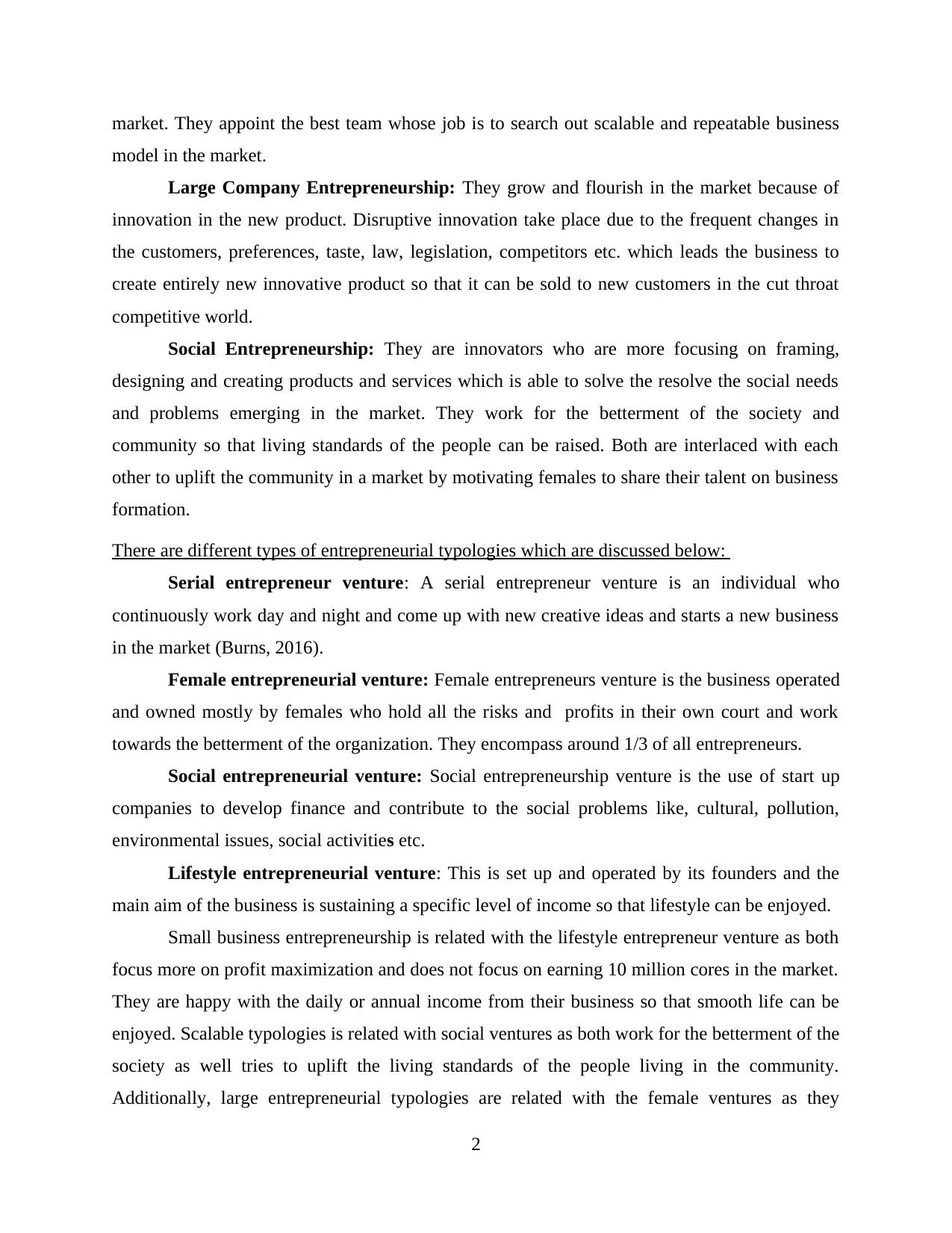
market. They appoint the best team whose job is to search out scalable and repeatable business
model in the market.
Large Company Entrepreneurship: They grow and flourish in the market because of
innovation in the new product. Disruptive innovation take place due to the frequent changes in
the customers, preferences, taste, law, legislation, competitors etc. which leads the business to
create entirely new innovative product so that it can be sold to new customers in the cut throat
competitive world.
Social Entrepreneurship: They are innovators who are more focusing on framing,
designing and creating products and services which is able to solve the resolve the social needs
and problems emerging in the market. They work for the betterment of the society and
community so that living standards of the people can be raised. Both are interlaced with each
other to uplift the community in a market by motivating females to share their talent on business
formation.
There are different types of entrepreneurial typologies which are discussed below:
Serial entrepreneur venture: A serial entrepreneur venture is an individual who
continuously work day and night and come up with new creative ideas and starts a new business
in the market (Burns, 2016).
Female entrepreneurial venture: Female entrepreneurs venture is the business operated
and owned mostly by females who hold all the risks and profits in their own court and work
towards the betterment of the organization. They encompass around 1/3 of all entrepreneurs.
Social entrepreneurial venture: Social entrepreneurship venture is the use of start up
companies to develop finance and contribute to the social problems like, cultural, pollution,
environmental issues, social activities etc.
Lifestyle entrepreneurial venture: This is set up and operated by its founders and the
main aim of the business is sustaining a specific level of income so that lifestyle can be enjoyed.
Small business entrepreneurship is related with the lifestyle entrepreneur venture as both
focus more on profit maximization and does not focus on earning 10 million cores in the market.
They are happy with the daily or annual income from their business so that smooth life can be
enjoyed. Scalable typologies is related with social ventures as both work for the betterment of the
society as well tries to uplift the living standards of the people living in the community.
Additionally, large entrepreneurial typologies are related with the female ventures as they
2
model in the market.
Large Company Entrepreneurship: They grow and flourish in the market because of
innovation in the new product. Disruptive innovation take place due to the frequent changes in
the customers, preferences, taste, law, legislation, competitors etc. which leads the business to
create entirely new innovative product so that it can be sold to new customers in the cut throat
competitive world.
Social Entrepreneurship: They are innovators who are more focusing on framing,
designing and creating products and services which is able to solve the resolve the social needs
and problems emerging in the market. They work for the betterment of the society and
community so that living standards of the people can be raised. Both are interlaced with each
other to uplift the community in a market by motivating females to share their talent on business
formation.
There are different types of entrepreneurial typologies which are discussed below:
Serial entrepreneur venture: A serial entrepreneur venture is an individual who
continuously work day and night and come up with new creative ideas and starts a new business
in the market (Burns, 2016).
Female entrepreneurial venture: Female entrepreneurs venture is the business operated
and owned mostly by females who hold all the risks and profits in their own court and work
towards the betterment of the organization. They encompass around 1/3 of all entrepreneurs.
Social entrepreneurial venture: Social entrepreneurship venture is the use of start up
companies to develop finance and contribute to the social problems like, cultural, pollution,
environmental issues, social activities etc.
Lifestyle entrepreneurial venture: This is set up and operated by its founders and the
main aim of the business is sustaining a specific level of income so that lifestyle can be enjoyed.
Small business entrepreneurship is related with the lifestyle entrepreneur venture as both
focus more on profit maximization and does not focus on earning 10 million cores in the market.
They are happy with the daily or annual income from their business so that smooth life can be
enjoyed. Scalable typologies is related with social ventures as both work for the betterment of the
society as well tries to uplift the living standards of the people living in the community.
Additionally, large entrepreneurial typologies are related with the female ventures as they
2
Paraphrase This Document
Need a fresh take? Get an instant paraphrase of this document with our AI Paraphraser
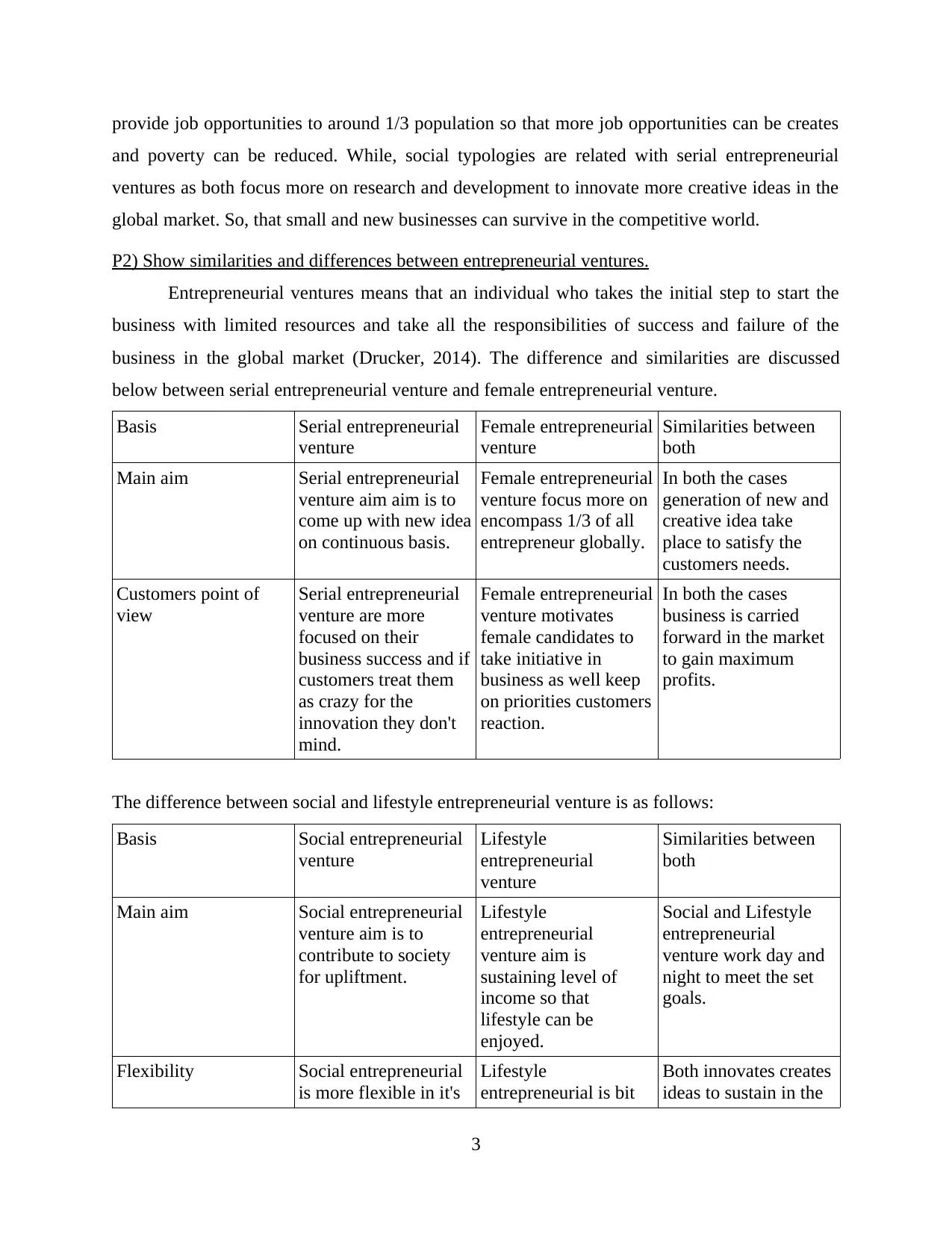
provide job opportunities to around 1/3 population so that more job opportunities can be creates
and poverty can be reduced. While, social typologies are related with serial entrepreneurial
ventures as both focus more on research and development to innovate more creative ideas in the
global market. So, that small and new businesses can survive in the competitive world.
P2) Show similarities and differences between entrepreneurial ventures.
Entrepreneurial ventures means that an individual who takes the initial step to start the
business with limited resources and take all the responsibilities of success and failure of the
business in the global market (Drucker, 2014). The difference and similarities are discussed
below between serial entrepreneurial venture and female entrepreneurial venture.
Basis Serial entrepreneurial
venture
Female entrepreneurial
venture
Similarities between
both
Main aim Serial entrepreneurial
venture aim aim is to
come up with new idea
on continuous basis.
Female entrepreneurial
venture focus more on
encompass 1/3 of all
entrepreneur globally.
In both the cases
generation of new and
creative idea take
place to satisfy the
customers needs.
Customers point of
view
Serial entrepreneurial
venture are more
focused on their
business success and if
customers treat them
as crazy for the
innovation they don't
mind.
Female entrepreneurial
venture motivates
female candidates to
take initiative in
business as well keep
on priorities customers
reaction.
In both the cases
business is carried
forward in the market
to gain maximum
profits.
The difference between social and lifestyle entrepreneurial venture is as follows:
Basis Social entrepreneurial
venture
Lifestyle
entrepreneurial
venture
Similarities between
both
Main aim Social entrepreneurial
venture aim is to
contribute to society
for upliftment.
Lifestyle
entrepreneurial
venture aim is
sustaining level of
income so that
lifestyle can be
enjoyed.
Social and Lifestyle
entrepreneurial
venture work day and
night to meet the set
goals.
Flexibility Social entrepreneurial
is more flexible in it's
Lifestyle
entrepreneurial is bit
Both innovates creates
ideas to sustain in the
3
and poverty can be reduced. While, social typologies are related with serial entrepreneurial
ventures as both focus more on research and development to innovate more creative ideas in the
global market. So, that small and new businesses can survive in the competitive world.
P2) Show similarities and differences between entrepreneurial ventures.
Entrepreneurial ventures means that an individual who takes the initial step to start the
business with limited resources and take all the responsibilities of success and failure of the
business in the global market (Drucker, 2014). The difference and similarities are discussed
below between serial entrepreneurial venture and female entrepreneurial venture.
Basis Serial entrepreneurial
venture
Female entrepreneurial
venture
Similarities between
both
Main aim Serial entrepreneurial
venture aim aim is to
come up with new idea
on continuous basis.
Female entrepreneurial
venture focus more on
encompass 1/3 of all
entrepreneur globally.
In both the cases
generation of new and
creative idea take
place to satisfy the
customers needs.
Customers point of
view
Serial entrepreneurial
venture are more
focused on their
business success and if
customers treat them
as crazy for the
innovation they don't
mind.
Female entrepreneurial
venture motivates
female candidates to
take initiative in
business as well keep
on priorities customers
reaction.
In both the cases
business is carried
forward in the market
to gain maximum
profits.
The difference between social and lifestyle entrepreneurial venture is as follows:
Basis Social entrepreneurial
venture
Lifestyle
entrepreneurial
venture
Similarities between
both
Main aim Social entrepreneurial
venture aim is to
contribute to society
for upliftment.
Lifestyle
entrepreneurial
venture aim is
sustaining level of
income so that
lifestyle can be
enjoyed.
Social and Lifestyle
entrepreneurial
venture work day and
night to meet the set
goals.
Flexibility Social entrepreneurial
is more flexible in it's
Lifestyle
entrepreneurial is bit
Both innovates creates
ideas to sustain in the
3
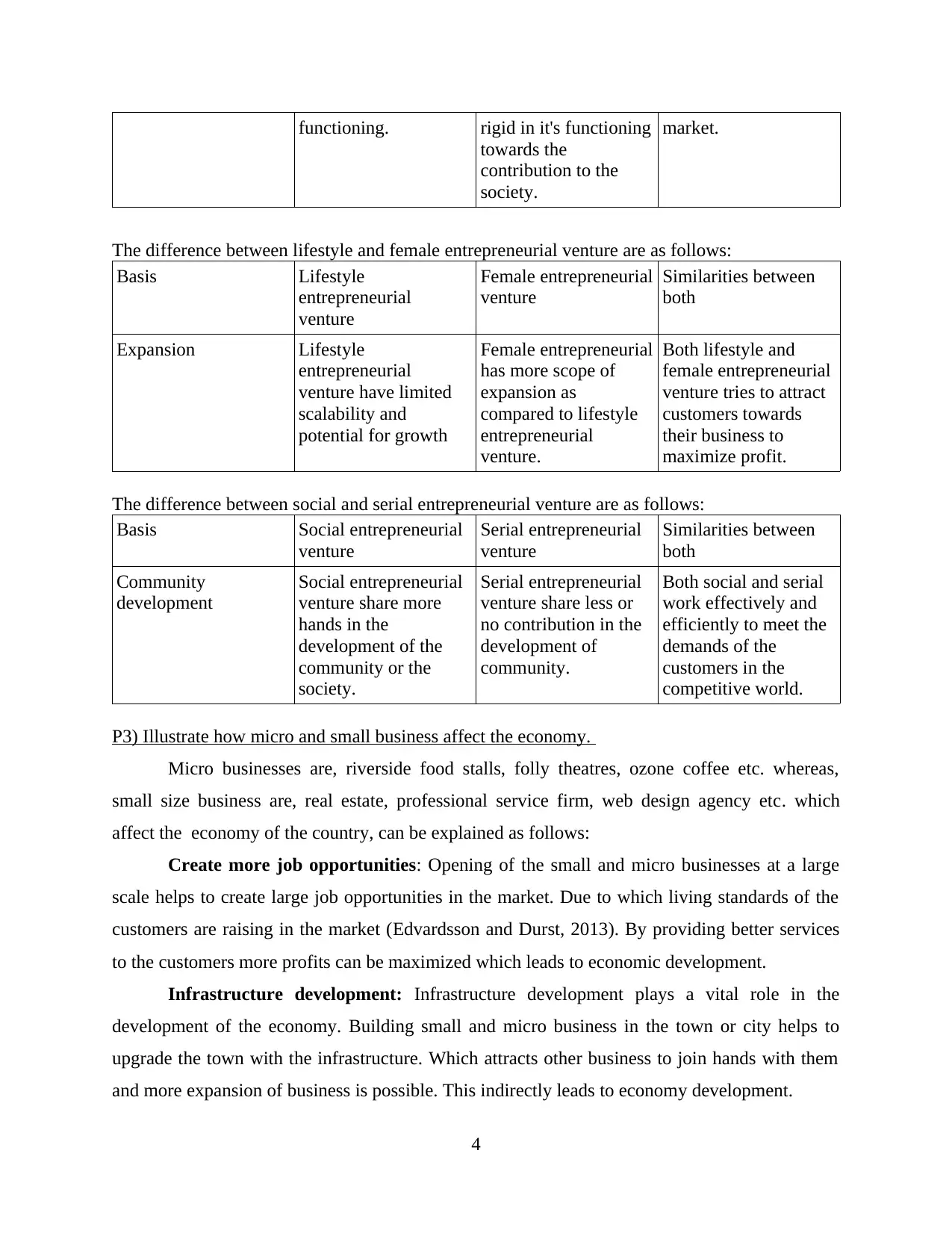
functioning. rigid in it's functioning
towards the
contribution to the
society.
market.
The difference between lifestyle and female entrepreneurial venture are as follows:
Basis Lifestyle
entrepreneurial
venture
Female entrepreneurial
venture
Similarities between
both
Expansion Lifestyle
entrepreneurial
venture have limited
scalability and
potential for growth
Female entrepreneurial
has more scope of
expansion as
compared to lifestyle
entrepreneurial
venture.
Both lifestyle and
female entrepreneurial
venture tries to attract
customers towards
their business to
maximize profit.
The difference between social and serial entrepreneurial venture are as follows:
Basis Social entrepreneurial
venture
Serial entrepreneurial
venture
Similarities between
both
Community
development
Social entrepreneurial
venture share more
hands in the
development of the
community or the
society.
Serial entrepreneurial
venture share less or
no contribution in the
development of
community.
Both social and serial
work effectively and
efficiently to meet the
demands of the
customers in the
competitive world.
P3) Illustrate how micro and small business affect the economy.
Micro businesses are, riverside food stalls, folly theatres, ozone coffee etc. whereas,
small size business are, real estate, professional service firm, web design agency etc. which
affect the economy of the country, can be explained as follows:
Create more job opportunities: Opening of the small and micro businesses at a large
scale helps to create large job opportunities in the market. Due to which living standards of the
customers are raising in the market (Edvardsson and Durst, 2013). By providing better services
to the customers more profits can be maximized which leads to economic development.
Infrastructure development: Infrastructure development plays a vital role in the
development of the economy. Building small and micro business in the town or city helps to
upgrade the town with the infrastructure. Which attracts other business to join hands with them
and more expansion of business is possible. This indirectly leads to economy development.
4
towards the
contribution to the
society.
market.
The difference between lifestyle and female entrepreneurial venture are as follows:
Basis Lifestyle
entrepreneurial
venture
Female entrepreneurial
venture
Similarities between
both
Expansion Lifestyle
entrepreneurial
venture have limited
scalability and
potential for growth
Female entrepreneurial
has more scope of
expansion as
compared to lifestyle
entrepreneurial
venture.
Both lifestyle and
female entrepreneurial
venture tries to attract
customers towards
their business to
maximize profit.
The difference between social and serial entrepreneurial venture are as follows:
Basis Social entrepreneurial
venture
Serial entrepreneurial
venture
Similarities between
both
Community
development
Social entrepreneurial
venture share more
hands in the
development of the
community or the
society.
Serial entrepreneurial
venture share less or
no contribution in the
development of
community.
Both social and serial
work effectively and
efficiently to meet the
demands of the
customers in the
competitive world.
P3) Illustrate how micro and small business affect the economy.
Micro businesses are, riverside food stalls, folly theatres, ozone coffee etc. whereas,
small size business are, real estate, professional service firm, web design agency etc. which
affect the economy of the country, can be explained as follows:
Create more job opportunities: Opening of the small and micro businesses at a large
scale helps to create large job opportunities in the market. Due to which living standards of the
customers are raising in the market (Edvardsson and Durst, 2013). By providing better services
to the customers more profits can be maximized which leads to economic development.
Infrastructure development: Infrastructure development plays a vital role in the
development of the economy. Building small and micro business in the town or city helps to
upgrade the town with the infrastructure. Which attracts other business to join hands with them
and more expansion of business is possible. This indirectly leads to economy development.
4
⊘ This is a preview!⊘
Do you want full access?
Subscribe today to unlock all pages.

Trusted by 1+ million students worldwide
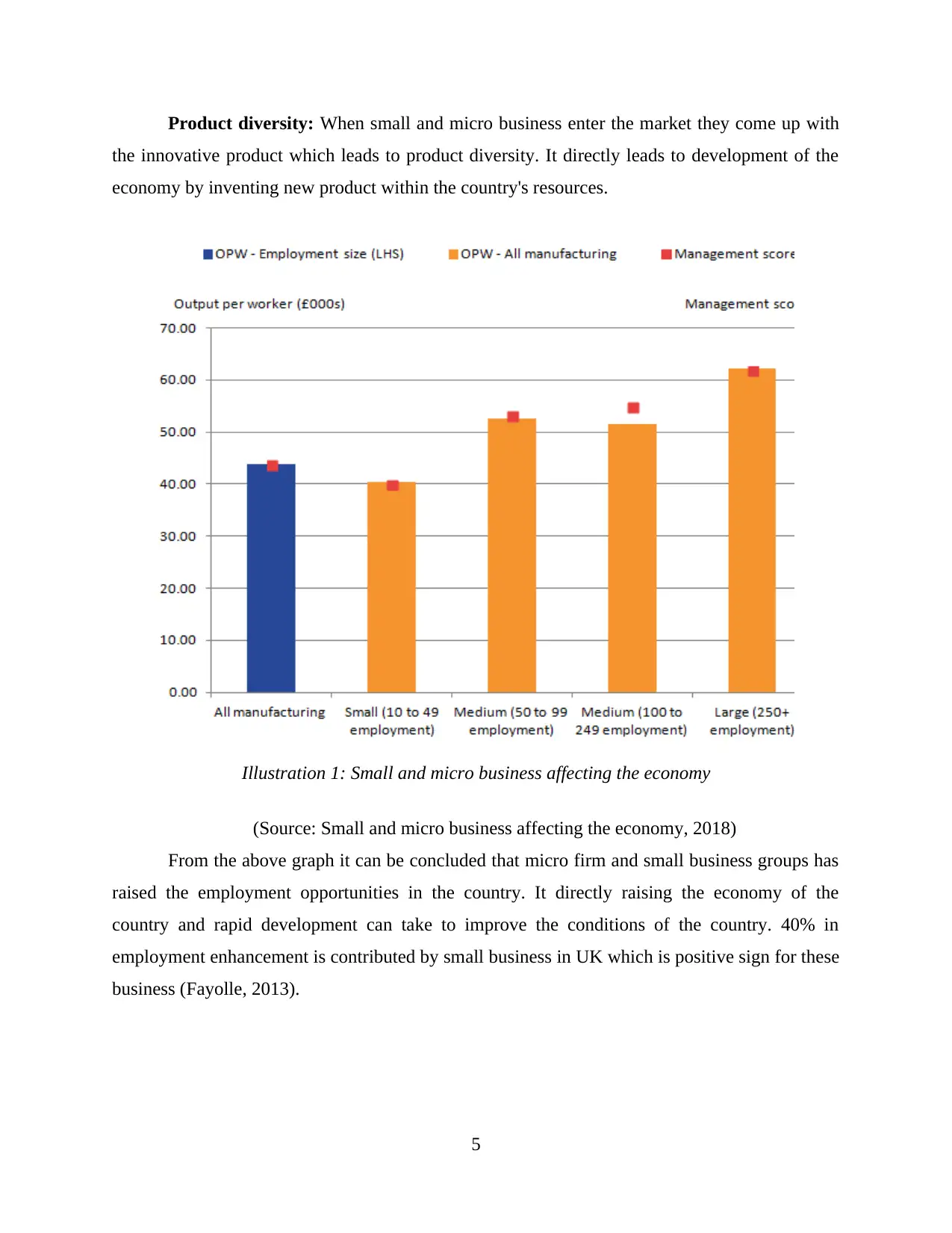
Product diversity: When small and micro business enter the market they come up with
the innovative product which leads to product diversity. It directly leads to development of the
economy by inventing new product within the country's resources.
(Source: Small and micro business affecting the economy, 2018)
From the above graph it can be concluded that micro firm and small business groups has
raised the employment opportunities in the country. It directly raising the economy of the
country and rapid development can take to improve the conditions of the country. 40% in
employment enhancement is contributed by small business in UK which is positive sign for these
business (Fayolle, 2013).
5
Illustration 1: Small and micro business affecting the economy
the innovative product which leads to product diversity. It directly leads to development of the
economy by inventing new product within the country's resources.
(Source: Small and micro business affecting the economy, 2018)
From the above graph it can be concluded that micro firm and small business groups has
raised the employment opportunities in the country. It directly raising the economy of the
country and rapid development can take to improve the conditions of the country. 40% in
employment enhancement is contributed by small business in UK which is positive sign for these
business (Fayolle, 2013).
5
Illustration 1: Small and micro business affecting the economy
Paraphrase This Document
Need a fresh take? Get an instant paraphrase of this document with our AI Paraphraser
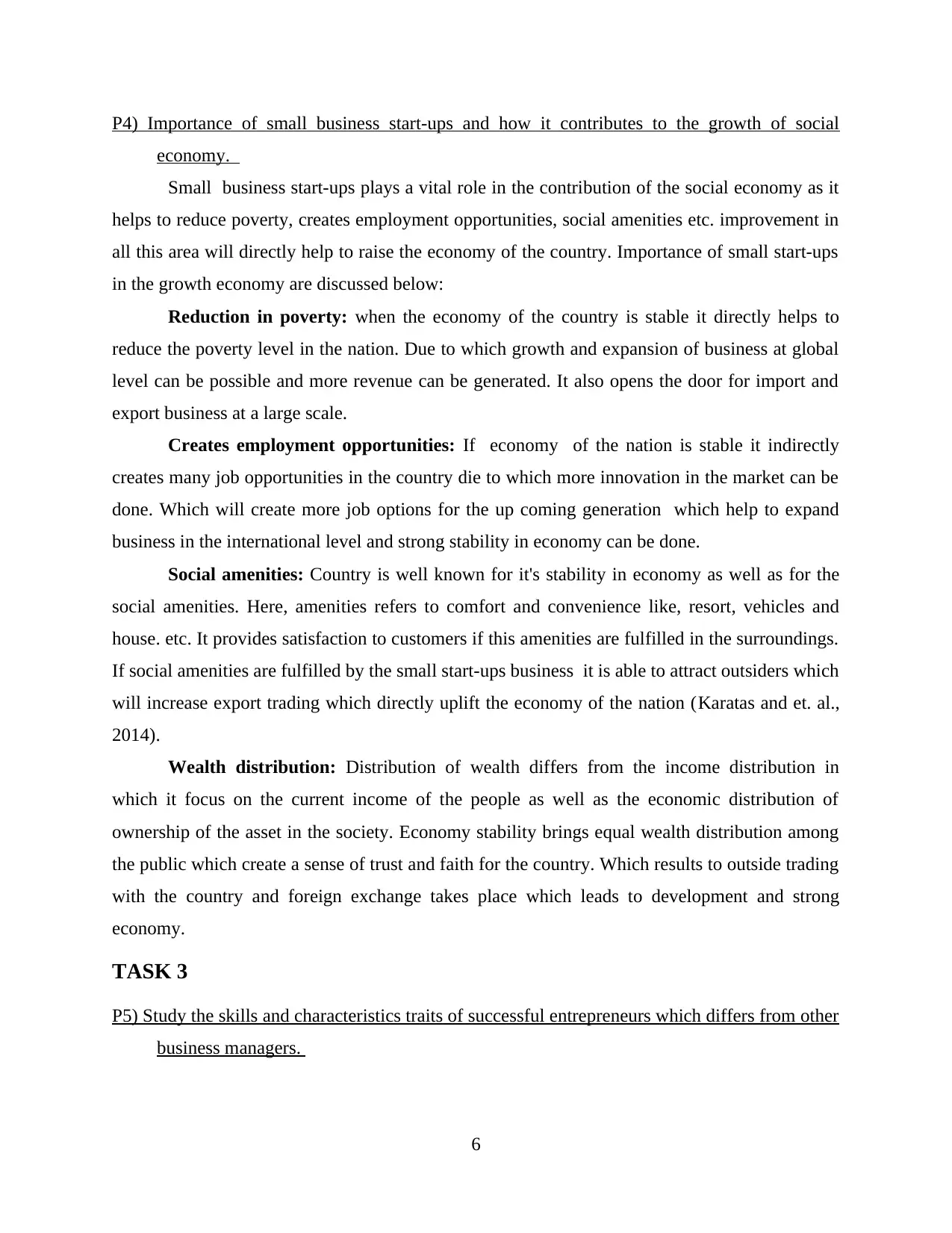
P4) Importance of small business start-ups and how it contributes to the growth of social
economy.
Small business start-ups plays a vital role in the contribution of the social economy as it
helps to reduce poverty, creates employment opportunities, social amenities etc. improvement in
all this area will directly help to raise the economy of the country. Importance of small start-ups
in the growth economy are discussed below:
Reduction in poverty: when the economy of the country is stable it directly helps to
reduce the poverty level in the nation. Due to which growth and expansion of business at global
level can be possible and more revenue can be generated. It also opens the door for import and
export business at a large scale.
Creates employment opportunities: If economy of the nation is stable it indirectly
creates many job opportunities in the country die to which more innovation in the market can be
done. Which will create more job options for the up coming generation which help to expand
business in the international level and strong stability in economy can be done.
Social amenities: Country is well known for it's stability in economy as well as for the
social amenities. Here, amenities refers to comfort and convenience like, resort, vehicles and
house. etc. It provides satisfaction to customers if this amenities are fulfilled in the surroundings.
If social amenities are fulfilled by the small start-ups business it is able to attract outsiders which
will increase export trading which directly uplift the economy of the nation (Karatas and et. al.,
2014).
Wealth distribution: Distribution of wealth differs from the income distribution in
which it focus on the current income of the people as well as the economic distribution of
ownership of the asset in the society. Economy stability brings equal wealth distribution among
the public which create a sense of trust and faith for the country. Which results to outside trading
with the country and foreign exchange takes place which leads to development and strong
economy.
TASK 3
P5) Study the skills and characteristics traits of successful entrepreneurs which differs from other
business managers.
6
economy.
Small business start-ups plays a vital role in the contribution of the social economy as it
helps to reduce poverty, creates employment opportunities, social amenities etc. improvement in
all this area will directly help to raise the economy of the country. Importance of small start-ups
in the growth economy are discussed below:
Reduction in poverty: when the economy of the country is stable it directly helps to
reduce the poverty level in the nation. Due to which growth and expansion of business at global
level can be possible and more revenue can be generated. It also opens the door for import and
export business at a large scale.
Creates employment opportunities: If economy of the nation is stable it indirectly
creates many job opportunities in the country die to which more innovation in the market can be
done. Which will create more job options for the up coming generation which help to expand
business in the international level and strong stability in economy can be done.
Social amenities: Country is well known for it's stability in economy as well as for the
social amenities. Here, amenities refers to comfort and convenience like, resort, vehicles and
house. etc. It provides satisfaction to customers if this amenities are fulfilled in the surroundings.
If social amenities are fulfilled by the small start-ups business it is able to attract outsiders which
will increase export trading which directly uplift the economy of the nation (Karatas and et. al.,
2014).
Wealth distribution: Distribution of wealth differs from the income distribution in
which it focus on the current income of the people as well as the economic distribution of
ownership of the asset in the society. Economy stability brings equal wealth distribution among
the public which create a sense of trust and faith for the country. Which results to outside trading
with the country and foreign exchange takes place which leads to development and strong
economy.
TASK 3
P5) Study the skills and characteristics traits of successful entrepreneurs which differs from other
business managers.
6
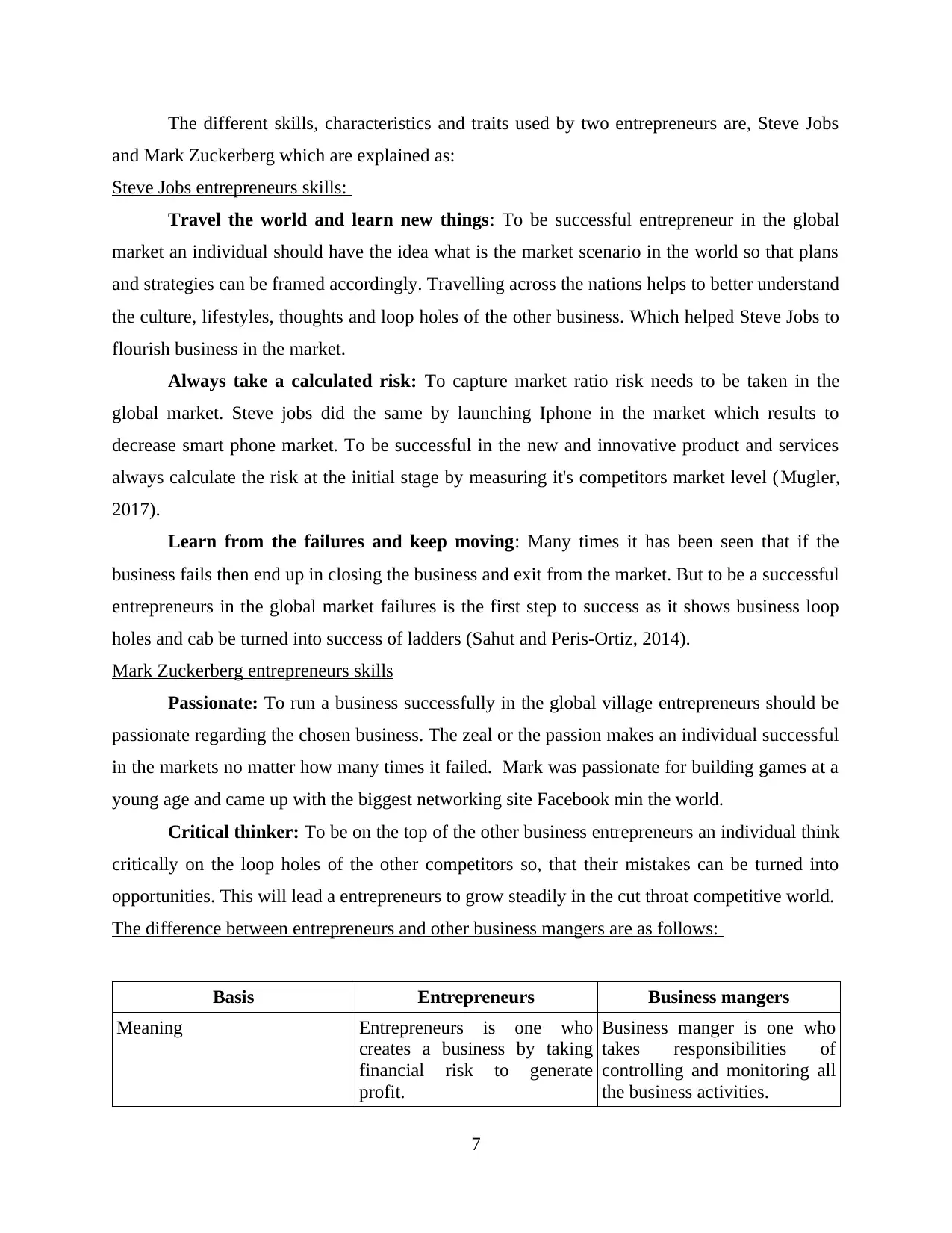
The different skills, characteristics and traits used by two entrepreneurs are, Steve Jobs
and Mark Zuckerberg which are explained as:
Steve Jobs entrepreneurs skills:
Travel the world and learn new things: To be successful entrepreneur in the global
market an individual should have the idea what is the market scenario in the world so that plans
and strategies can be framed accordingly. Travelling across the nations helps to better understand
the culture, lifestyles, thoughts and loop holes of the other business. Which helped Steve Jobs to
flourish business in the market.
Always take a calculated risk: To capture market ratio risk needs to be taken in the
global market. Steve jobs did the same by launching Iphone in the market which results to
decrease smart phone market. To be successful in the new and innovative product and services
always calculate the risk at the initial stage by measuring it's competitors market level (Mugler,
2017).
Learn from the failures and keep moving: Many times it has been seen that if the
business fails then end up in closing the business and exit from the market. But to be a successful
entrepreneurs in the global market failures is the first step to success as it shows business loop
holes and cab be turned into success of ladders (Sahut and Peris-Ortiz, 2014).
Mark Zuckerberg entrepreneurs skills
Passionate: To run a business successfully in the global village entrepreneurs should be
passionate regarding the chosen business. The zeal or the passion makes an individual successful
in the markets no matter how many times it failed. Mark was passionate for building games at a
young age and came up with the biggest networking site Facebook min the world.
Critical thinker: To be on the top of the other business entrepreneurs an individual think
critically on the loop holes of the other competitors so, that their mistakes can be turned into
opportunities. This will lead a entrepreneurs to grow steadily in the cut throat competitive world.
The difference between entrepreneurs and other business mangers are as follows:
Basis Entrepreneurs Business mangers
Meaning Entrepreneurs is one who
creates a business by taking
financial risk to generate
profit.
Business manger is one who
takes responsibilities of
controlling and monitoring all
the business activities.
7
and Mark Zuckerberg which are explained as:
Steve Jobs entrepreneurs skills:
Travel the world and learn new things: To be successful entrepreneur in the global
market an individual should have the idea what is the market scenario in the world so that plans
and strategies can be framed accordingly. Travelling across the nations helps to better understand
the culture, lifestyles, thoughts and loop holes of the other business. Which helped Steve Jobs to
flourish business in the market.
Always take a calculated risk: To capture market ratio risk needs to be taken in the
global market. Steve jobs did the same by launching Iphone in the market which results to
decrease smart phone market. To be successful in the new and innovative product and services
always calculate the risk at the initial stage by measuring it's competitors market level (Mugler,
2017).
Learn from the failures and keep moving: Many times it has been seen that if the
business fails then end up in closing the business and exit from the market. But to be a successful
entrepreneurs in the global market failures is the first step to success as it shows business loop
holes and cab be turned into success of ladders (Sahut and Peris-Ortiz, 2014).
Mark Zuckerberg entrepreneurs skills
Passionate: To run a business successfully in the global village entrepreneurs should be
passionate regarding the chosen business. The zeal or the passion makes an individual successful
in the markets no matter how many times it failed. Mark was passionate for building games at a
young age and came up with the biggest networking site Facebook min the world.
Critical thinker: To be on the top of the other business entrepreneurs an individual think
critically on the loop holes of the other competitors so, that their mistakes can be turned into
opportunities. This will lead a entrepreneurs to grow steadily in the cut throat competitive world.
The difference between entrepreneurs and other business mangers are as follows:
Basis Entrepreneurs Business mangers
Meaning Entrepreneurs is one who
creates a business by taking
financial risk to generate
profit.
Business manger is one who
takes responsibilities of
controlling and monitoring all
the business activities.
7
⊘ This is a preview!⊘
Do you want full access?
Subscribe today to unlock all pages.

Trusted by 1+ million students worldwide
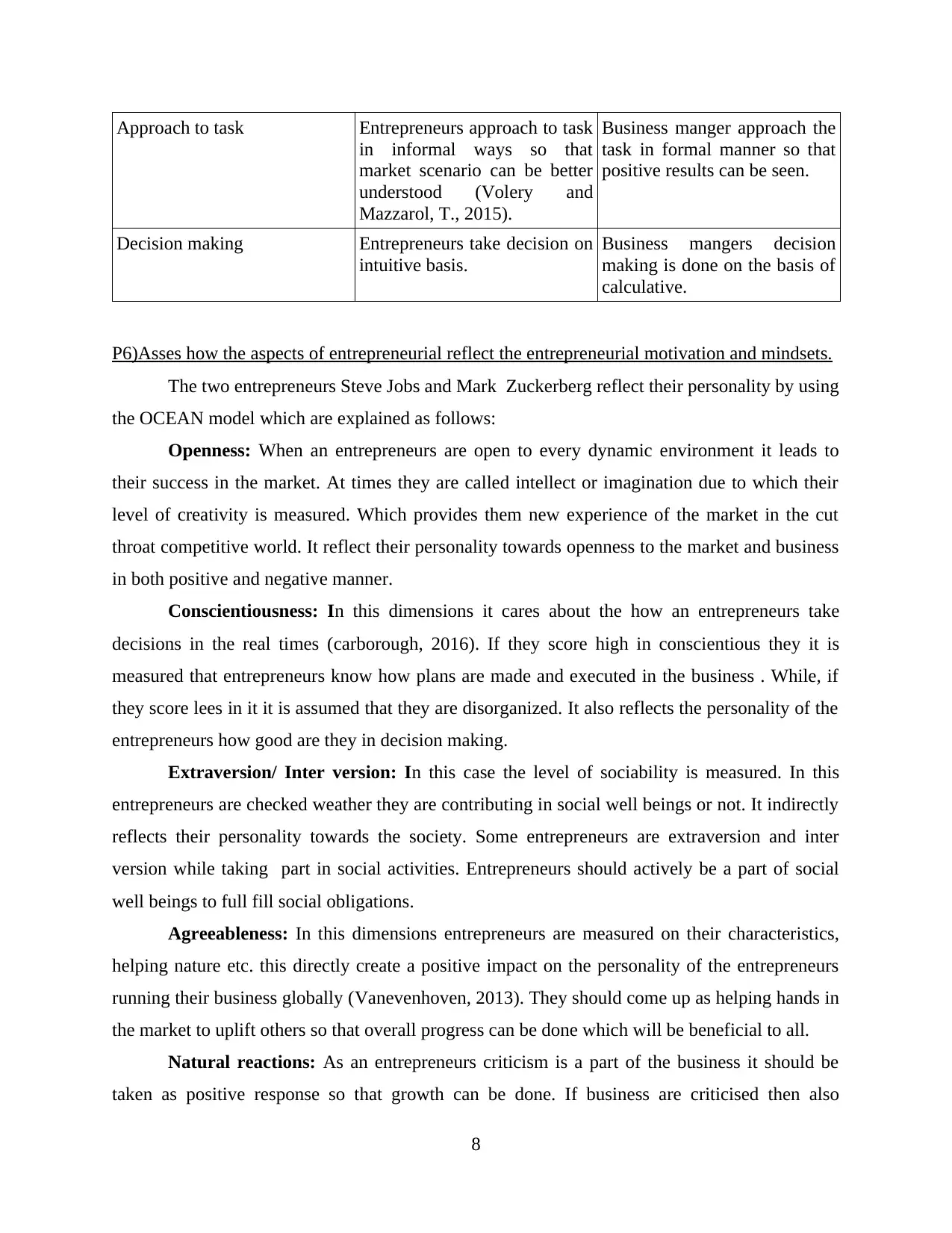
Approach to task Entrepreneurs approach to task
in informal ways so that
market scenario can be better
understood (Volery and
Mazzarol, T., 2015).
Business manger approach the
task in formal manner so that
positive results can be seen.
Decision making Entrepreneurs take decision on
intuitive basis.
Business mangers decision
making is done on the basis of
calculative.
P6)Asses how the aspects of entrepreneurial reflect the entrepreneurial motivation and mindsets.
The two entrepreneurs Steve Jobs and Mark Zuckerberg reflect their personality by using
the OCEAN model which are explained as follows:
Openness: When an entrepreneurs are open to every dynamic environment it leads to
their success in the market. At times they are called intellect or imagination due to which their
level of creativity is measured. Which provides them new experience of the market in the cut
throat competitive world. It reflect their personality towards openness to the market and business
in both positive and negative manner.
Conscientiousness: In this dimensions it cares about the how an entrepreneurs take
decisions in the real times (carborough, 2016). If they score high in conscientious they it is
measured that entrepreneurs know how plans are made and executed in the business . While, if
they score lees in it it is assumed that they are disorganized. It also reflects the personality of the
entrepreneurs how good are they in decision making.
Extraversion/ Inter version: In this case the level of sociability is measured. In this
entrepreneurs are checked weather they are contributing in social well beings or not. It indirectly
reflects their personality towards the society. Some entrepreneurs are extraversion and inter
version while taking part in social activities. Entrepreneurs should actively be a part of social
well beings to full fill social obligations.
Agreeableness: In this dimensions entrepreneurs are measured on their characteristics,
helping nature etc. this directly create a positive impact on the personality of the entrepreneurs
running their business globally (Vanevenhoven, 2013). They should come up as helping hands in
the market to uplift others so that overall progress can be done which will be beneficial to all.
Natural reactions: As an entrepreneurs criticism is a part of the business it should be
taken as positive response so that growth can be done. If business are criticised then also
8
in informal ways so that
market scenario can be better
understood (Volery and
Mazzarol, T., 2015).
Business manger approach the
task in formal manner so that
positive results can be seen.
Decision making Entrepreneurs take decision on
intuitive basis.
Business mangers decision
making is done on the basis of
calculative.
P6)Asses how the aspects of entrepreneurial reflect the entrepreneurial motivation and mindsets.
The two entrepreneurs Steve Jobs and Mark Zuckerberg reflect their personality by using
the OCEAN model which are explained as follows:
Openness: When an entrepreneurs are open to every dynamic environment it leads to
their success in the market. At times they are called intellect or imagination due to which their
level of creativity is measured. Which provides them new experience of the market in the cut
throat competitive world. It reflect their personality towards openness to the market and business
in both positive and negative manner.
Conscientiousness: In this dimensions it cares about the how an entrepreneurs take
decisions in the real times (carborough, 2016). If they score high in conscientious they it is
measured that entrepreneurs know how plans are made and executed in the business . While, if
they score lees in it it is assumed that they are disorganized. It also reflects the personality of the
entrepreneurs how good are they in decision making.
Extraversion/ Inter version: In this case the level of sociability is measured. In this
entrepreneurs are checked weather they are contributing in social well beings or not. It indirectly
reflects their personality towards the society. Some entrepreneurs are extraversion and inter
version while taking part in social activities. Entrepreneurs should actively be a part of social
well beings to full fill social obligations.
Agreeableness: In this dimensions entrepreneurs are measured on their characteristics,
helping nature etc. this directly create a positive impact on the personality of the entrepreneurs
running their business globally (Vanevenhoven, 2013). They should come up as helping hands in
the market to uplift others so that overall progress can be done which will be beneficial to all.
Natural reactions: As an entrepreneurs criticism is a part of the business it should be
taken as positive response so that growth can be done. If business are criticised then also
8
Paraphrase This Document
Need a fresh take? Get an instant paraphrase of this document with our AI Paraphraser
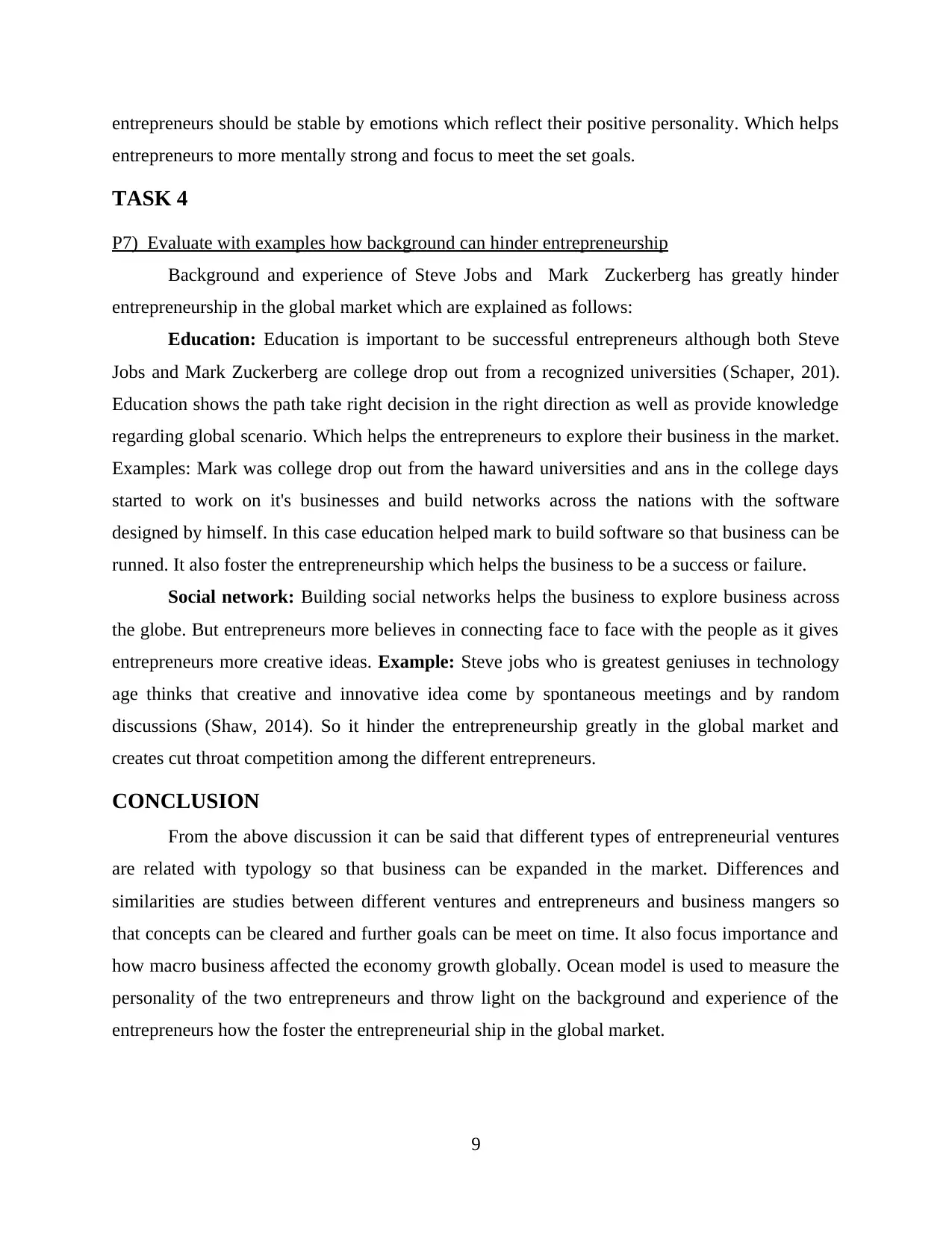
entrepreneurs should be stable by emotions which reflect their positive personality. Which helps
entrepreneurs to more mentally strong and focus to meet the set goals.
TASK 4
P7) Evaluate with examples how background can hinder entrepreneurship
Background and experience of Steve Jobs and Mark Zuckerberg has greatly hinder
entrepreneurship in the global market which are explained as follows:
Education: Education is important to be successful entrepreneurs although both Steve
Jobs and Mark Zuckerberg are college drop out from a recognized universities (Schaper, 201).
Education shows the path take right decision in the right direction as well as provide knowledge
regarding global scenario. Which helps the entrepreneurs to explore their business in the market.
Examples: Mark was college drop out from the haward universities and ans in the college days
started to work on it's businesses and build networks across the nations with the software
designed by himself. In this case education helped mark to build software so that business can be
runned. It also foster the entrepreneurship which helps the business to be a success or failure.
Social network: Building social networks helps the business to explore business across
the globe. But entrepreneurs more believes in connecting face to face with the people as it gives
entrepreneurs more creative ideas. Example: Steve jobs who is greatest geniuses in technology
age thinks that creative and innovative idea come by spontaneous meetings and by random
discussions (Shaw, 2014). So it hinder the entrepreneurship greatly in the global market and
creates cut throat competition among the different entrepreneurs.
CONCLUSION
From the above discussion it can be said that different types of entrepreneurial ventures
are related with typology so that business can be expanded in the market. Differences and
similarities are studies between different ventures and entrepreneurs and business mangers so
that concepts can be cleared and further goals can be meet on time. It also focus importance and
how macro business affected the economy growth globally. Ocean model is used to measure the
personality of the two entrepreneurs and throw light on the background and experience of the
entrepreneurs how the foster the entrepreneurial ship in the global market.
9
entrepreneurs to more mentally strong and focus to meet the set goals.
TASK 4
P7) Evaluate with examples how background can hinder entrepreneurship
Background and experience of Steve Jobs and Mark Zuckerberg has greatly hinder
entrepreneurship in the global market which are explained as follows:
Education: Education is important to be successful entrepreneurs although both Steve
Jobs and Mark Zuckerberg are college drop out from a recognized universities (Schaper, 201).
Education shows the path take right decision in the right direction as well as provide knowledge
regarding global scenario. Which helps the entrepreneurs to explore their business in the market.
Examples: Mark was college drop out from the haward universities and ans in the college days
started to work on it's businesses and build networks across the nations with the software
designed by himself. In this case education helped mark to build software so that business can be
runned. It also foster the entrepreneurship which helps the business to be a success or failure.
Social network: Building social networks helps the business to explore business across
the globe. But entrepreneurs more believes in connecting face to face with the people as it gives
entrepreneurs more creative ideas. Example: Steve jobs who is greatest geniuses in technology
age thinks that creative and innovative idea come by spontaneous meetings and by random
discussions (Shaw, 2014). So it hinder the entrepreneurship greatly in the global market and
creates cut throat competition among the different entrepreneurs.
CONCLUSION
From the above discussion it can be said that different types of entrepreneurial ventures
are related with typology so that business can be expanded in the market. Differences and
similarities are studies between different ventures and entrepreneurs and business mangers so
that concepts can be cleared and further goals can be meet on time. It also focus importance and
how macro business affected the economy growth globally. Ocean model is used to measure the
personality of the two entrepreneurs and throw light on the background and experience of the
entrepreneurs how the foster the entrepreneurial ship in the global market.
9
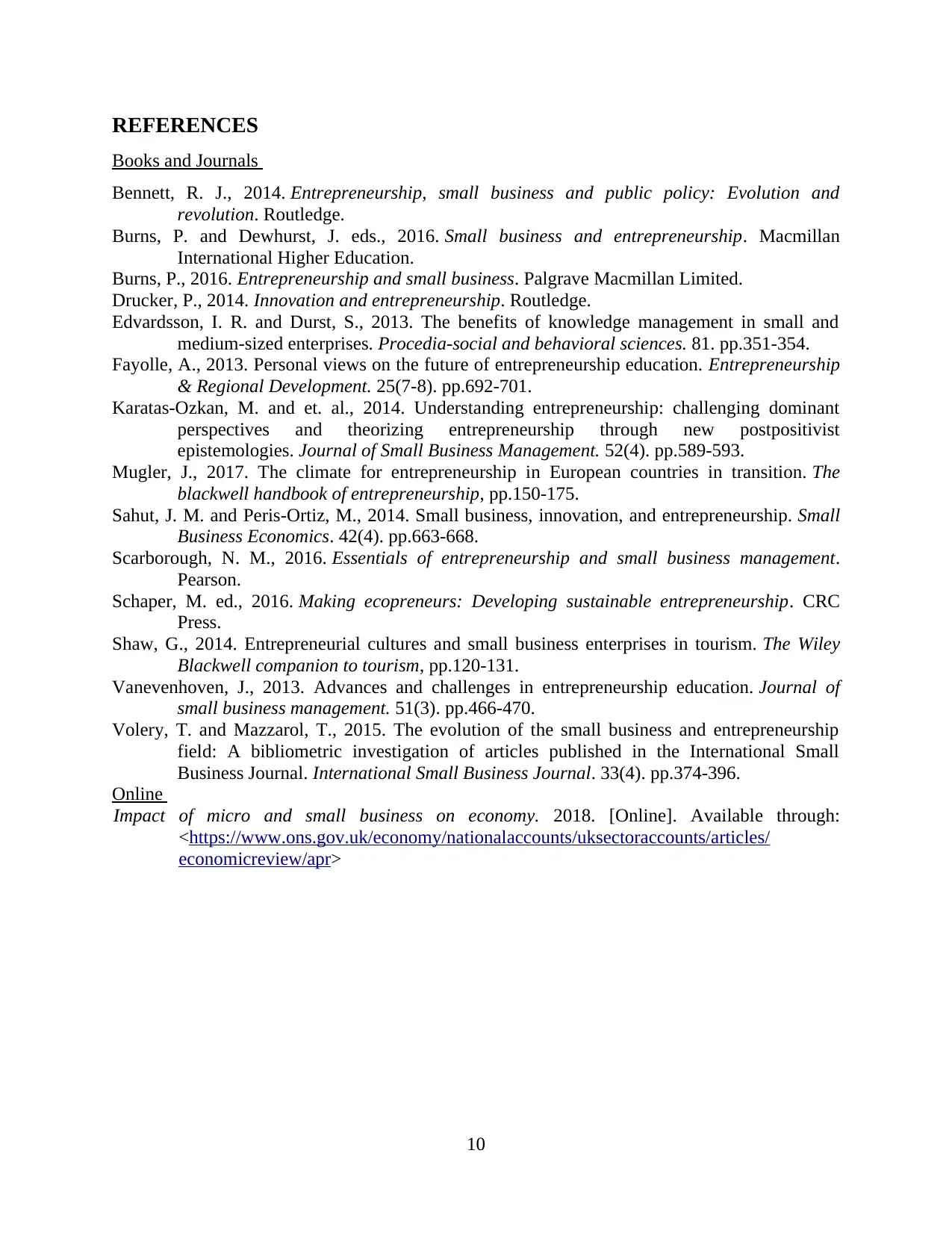
REFERENCES
Books and Journals
Bennett, R. J., 2014. Entrepreneurship, small business and public policy: Evolution and
revolution. Routledge.
Burns, P. and Dewhurst, J. eds., 2016. Small business and entrepreneurship. Macmillan
International Higher Education.
Burns, P., 2016. Entrepreneurship and small business. Palgrave Macmillan Limited.
Drucker, P., 2014. Innovation and entrepreneurship. Routledge.
Edvardsson, I. R. and Durst, S., 2013. The benefits of knowledge management in small and
medium-sized enterprises. Procedia-social and behavioral sciences. 81. pp.351-354.
Fayolle, A., 2013. Personal views on the future of entrepreneurship education. Entrepreneurship
& Regional Development. 25(7-8). pp.692-701.
Karatas‐Ozkan, M. and et. al., 2014. Understanding entrepreneurship: challenging dominant
perspectives and theorizing entrepreneurship through new postpositivist
epistemologies. Journal of Small Business Management. 52(4). pp.589-593.
Mugler, J., 2017. The climate for entrepreneurship in European countries in transition. The
blackwell handbook of entrepreneurship, pp.150-175.
Sahut, J. M. and Peris-Ortiz, M., 2014. Small business, innovation, and entrepreneurship. Small
Business Economics. 42(4). pp.663-668.
Scarborough, N. M., 2016. Essentials of entrepreneurship and small business management.
Pearson.
Schaper, M. ed., 2016. Making ecopreneurs: Developing sustainable entrepreneurship. CRC
Press.
Shaw, G., 2014. Entrepreneurial cultures and small business enterprises in tourism. The Wiley
Blackwell companion to tourism, pp.120-131.
Vanevenhoven, J., 2013. Advances and challenges in entrepreneurship education. Journal of
small business management. 51(3). pp.466-470.
Volery, T. and Mazzarol, T., 2015. The evolution of the small business and entrepreneurship
field: A bibliometric investigation of articles published in the International Small
Business Journal. International Small Business Journal. 33(4). pp.374-396.
Online
Impact of micro and small business on economy. 2018. [Online]. Available through:
<https://www.ons.gov.uk/economy/nationalaccounts/uksectoraccounts/articles/
economicreview/apr>
10
Books and Journals
Bennett, R. J., 2014. Entrepreneurship, small business and public policy: Evolution and
revolution. Routledge.
Burns, P. and Dewhurst, J. eds., 2016. Small business and entrepreneurship. Macmillan
International Higher Education.
Burns, P., 2016. Entrepreneurship and small business. Palgrave Macmillan Limited.
Drucker, P., 2014. Innovation and entrepreneurship. Routledge.
Edvardsson, I. R. and Durst, S., 2013. The benefits of knowledge management in small and
medium-sized enterprises. Procedia-social and behavioral sciences. 81. pp.351-354.
Fayolle, A., 2013. Personal views on the future of entrepreneurship education. Entrepreneurship
& Regional Development. 25(7-8). pp.692-701.
Karatas‐Ozkan, M. and et. al., 2014. Understanding entrepreneurship: challenging dominant
perspectives and theorizing entrepreneurship through new postpositivist
epistemologies. Journal of Small Business Management. 52(4). pp.589-593.
Mugler, J., 2017. The climate for entrepreneurship in European countries in transition. The
blackwell handbook of entrepreneurship, pp.150-175.
Sahut, J. M. and Peris-Ortiz, M., 2014. Small business, innovation, and entrepreneurship. Small
Business Economics. 42(4). pp.663-668.
Scarborough, N. M., 2016. Essentials of entrepreneurship and small business management.
Pearson.
Schaper, M. ed., 2016. Making ecopreneurs: Developing sustainable entrepreneurship. CRC
Press.
Shaw, G., 2014. Entrepreneurial cultures and small business enterprises in tourism. The Wiley
Blackwell companion to tourism, pp.120-131.
Vanevenhoven, J., 2013. Advances and challenges in entrepreneurship education. Journal of
small business management. 51(3). pp.466-470.
Volery, T. and Mazzarol, T., 2015. The evolution of the small business and entrepreneurship
field: A bibliometric investigation of articles published in the International Small
Business Journal. International Small Business Journal. 33(4). pp.374-396.
Online
Impact of micro and small business on economy. 2018. [Online]. Available through:
<https://www.ons.gov.uk/economy/nationalaccounts/uksectoraccounts/articles/
economicreview/apr>
10
⊘ This is a preview!⊘
Do you want full access?
Subscribe today to unlock all pages.

Trusted by 1+ million students worldwide
1 out of 12
Related Documents
Your All-in-One AI-Powered Toolkit for Academic Success.
+13062052269
info@desklib.com
Available 24*7 on WhatsApp / Email
![[object Object]](/_next/static/media/star-bottom.7253800d.svg)
Unlock your academic potential
Copyright © 2020–2026 A2Z Services. All Rights Reserved. Developed and managed by ZUCOL.





![Entrepreneurship and Small Business Impact Report - [University Name]](/_next/image/?url=https%3A%2F%2Fdesklib.com%2Fmedia%2Fimages%2Fwj%2Fd1f42599211847658d3fd556aa563fa5.jpg&w=256&q=75)